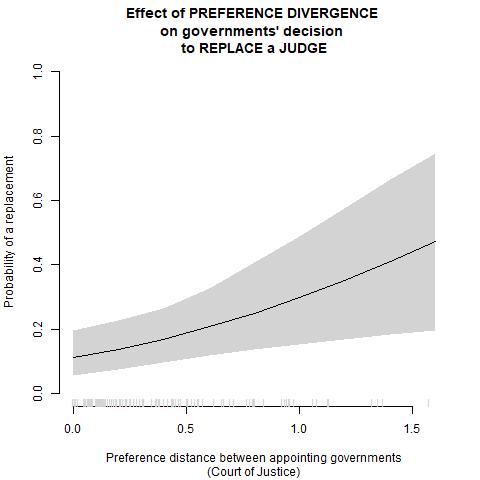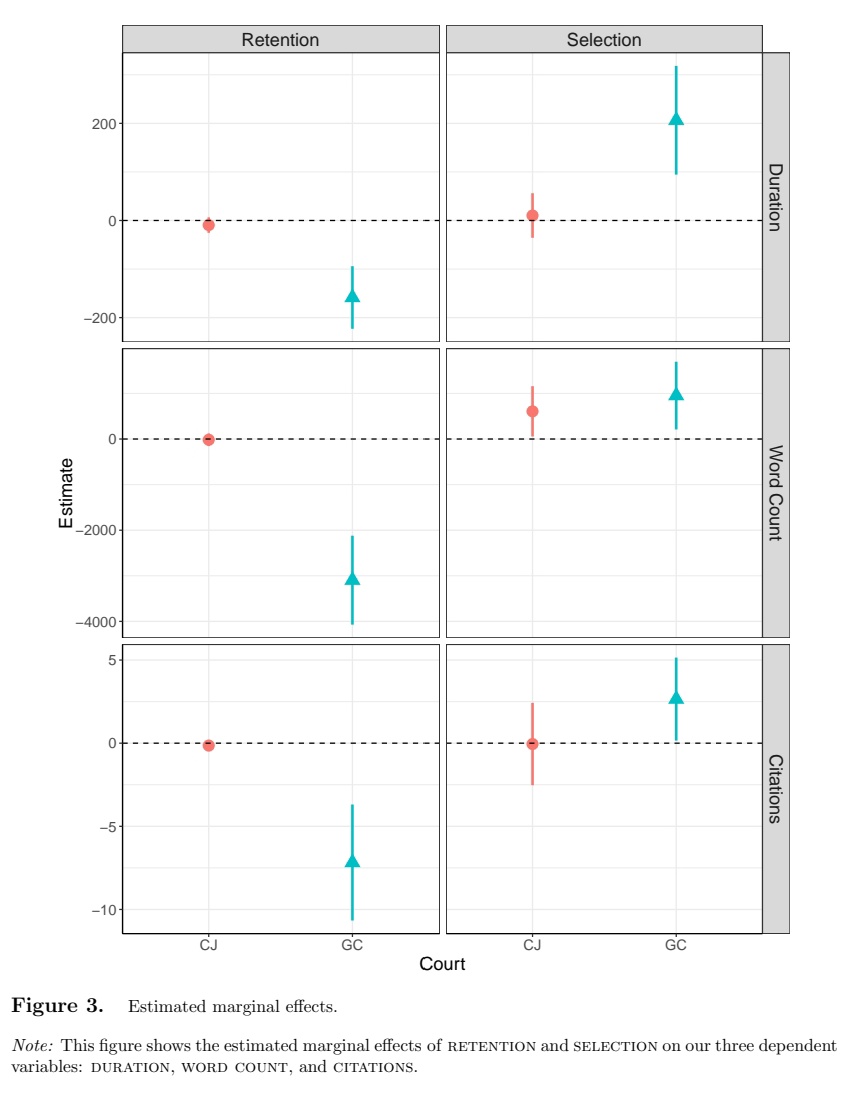Little research exists on how judges enter the Court and how its internal organization affects decision making. This project opens the black box of these decision-making processes to consider governments’ and judges’ strategic behavior.
I show that judges’ performance and governments’ political preferences are intertwined both when judges are appointed and when influence is distributed within the Court.
Judicial appointments to the CJEU
- “Shaping the Bench: The Effect of Ideology, Impact, and Information Quality on Judicial Reappointments” with Daniel Naurin presented at the ECPR Joint Sessions 2019 (Mons)

Courts’ institutional design has significant implications for judicial independence and accountability, particularly when terms are renewable. Policy-seeking selectors often consider judges’ past service to predict their future policy impact. However, the same judicial record may carry more or less weight in the assessment, depending on the court’s case-management process.
Drawing on original data on reappointments to the Court of Justice of the European Union, we show that reappointments are made based on both ideology and impact. Transparent, selective allocation of influential positions in the court favors the retention of high-impact judges, while non-selective allocations do not. Secret voting – conventionally seen as safeguarding judicial independence – also does not shield judges against ideological deselection. Our analysis unveils new insights into when judicial accountability incentivizes effort. It also challenges the prevailing belief that renewable terms decrease judicial independence, instead suggesting that selectors partially rely on evaluations by court members for reappointment decisions.
A draft version can be found here.
- “How do merit commissions affect judicial behavior? Evidence from the Court of Justice of the European Union” with Sivaram Cheruvu, Joshua Fjelstul, and Daniel Naurin presented at APSA 2022 (Montréal)

Governments create monitoring entities to ensure that policymakers are working effectively. Monitors’ control over retaining and selecting policymakers, however, may create incentives that lead to sub-optimal outcomes. One such entity is a merit commission (also known as a judicial council) that evaluates judges subject to retention and (or) selection. How do merit commissions affect judicial behavior? We construct a formal model arguing that lower competence incumbent judges only subject to merit retention will complete cases more quickly at the expense of quality opinion-writing, as their productivity is a signal of their effort investment to the commission. Conversely, judges subject to merit selection and subsequent retention will not make the same tradeoff, as the commission’s initial selection of them makes it more costly for the commission to negatively evaluate them upon retention. We provide evidence leveraging the Article 255 panel for (re)appointments to the Court of Justice of the European Union.
Internal organization and decision making
- “The effect of ideology on court rulings: the role of judges in state aid litigation before the Court of Justice of the EU” with Erik Voeten presented at the EPSA annual conference 2024 (Cologne)
Can governments influence the ideological direction of the Court of Justice of the European Union (CJEU) through judicial appointments? How does the internal allocation of responsibilities, such as the assignment of reporting judges, affect CJEU decisions? These questions have been difficult to answer given that the CJEU publishes its judgments as a collective. We present a simple model in which a reporting judge is assigned the responsibility to propose a draft judgment to a panel, which can then amend and vote on it. The model yields several observable implications, including that both the ideological preferences of the median and the reporter judge influence Court decisions. We test the implications of the model using all state aid annulment cases against EU Commission decisions brought either by private litigants or governments in the 1990-2021 period. We find that as the median judge is appointed by a more left-wing government, the Court becomes more likely to rule in favor of state aid. The ideological preferences of the reporting judge also shape Court decisions. These findings shed new light on both the judicial behavior of the Court and its alleged neoliberal bias.
Published work
If who makes decisions within courts matters for the outcome of cases and their reception, then studying how cases and judges are matched is essential to understanding judicial independence.
-
“The CJEU Database Platform: Decisions and Decision-Makers” (2023) with Stein Arne Brekke, Joshua Fjelstul and Daniel Naurin. Journal of Law and Courts 11(2), 389-410.
-
“Building legitimacy: strategic case allocations in the Court of Justice of the European Union” (2020) Journal of European Public Policy 27 (8), 1215-1235.
